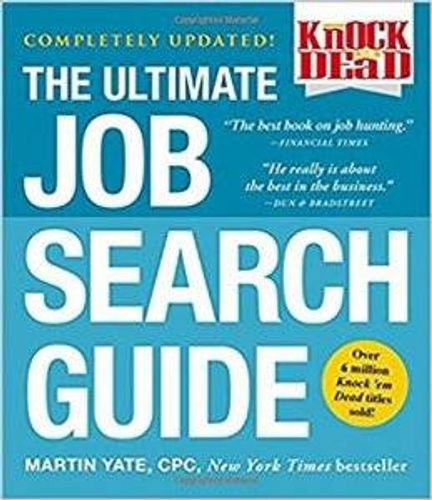The 7 Transferable Skills to Help You Change Careers
The 'Knock 'em Dead' author says they're the foundation of professional success
(The following is excerpted from Knock 'em Dead: The Ultimate Job Search Guide Copyright © 2017 by Martin John Yate, CPC, and published by Adams Media, a division of Simon and Schuster. Used by permission of the publisher. All rights reserved. The Kindle version is available for 99 cents until Feb. 11.)

There are certain keywords in almost every job posting that relate to skills: communication, multitasking, teamwork, creativity, critical thinking and leadership. These words represent a secret language that few job hunters understand. The ones who do “get it” are also the ones who get the job offers. That’s because these keywords and phrases represent the skills that enable you to do your job well, whatever that job may be. They are known as transferable skills because no matter what the job or profession is, they make the difference between success and failure.
Transferable skills are ones that apply in all professions. They are the foundation of all the professional success you will experience in this and other careers you may pursue over the years.
A Review of Transferable Skills

As you read through the following breakdown of each transferable skill, consider your own varying strengths and weaknesses. You may, for example, read about communication, and think, “Yes, I can see how communication skills are important in all jobs and at all levels of the promotional ladder, and, hallelujah, I have good communication skills.” Take time to recall examples of your communication skills and the role they play in the success of your work.
You might also read about multitasking skills and realize that you need to improve in that area. Whenever you identify a transferable skill that needs work, you have found a professional development project: improving that skill. Your attention to those areas will repay you for the rest of your working life, no matter how you make a living.
The 7 Transferable Skills
Here are the seven transferable skills that will speed the conclusion of this job search and your long-term professional success. You’ll find that you already have some of them to a greater or lesser degree, and if you are committed to making a success of your life, you’ll commit to further development of all of them.
- Technical
- Communication
- Critical Thinking
- Multitasking
- Teamwork
- Creativity
- Leadership
All the transferable skills are interconnected — for example, good verbal skills require both listening and critical thinking skills to accurately process incoming information; these enable you to present your outgoing verbal messaging persuasively in light of the interests and sophistication of your audience so that it is understood and accepted.
Effectively develop the following seven transferable skills and you’ll gain enormous control over what you can achieve, how you are perceived and what happens in your life.
Technical Skills
One of the technical skills essential to every job is technological competence. Even when you are not working in a technology field, strong technology skills will enhance your stability and help you leverage professional growth. Staying current with the essential technical and technology skills of your chosen career path is the keystone of your professional stability and growth.
Technology constantly changes the nature of our jobs and the ways in which they are executed. As a result, if you want to stay employable, you need to stay current with the skills most prized in your professional world.
Communication Skills
Every professional job today requires communication skills; promotions and professional success are impossible without them. But communication embraces much more than listening and speaking. When the professional world talks about communication skills, it is referring to four primary skills and four supportive skills.
The primary communication skills are:
- Verbal skills — what you say and how you say it
- Listening skills — listening to understand, rather than just waiting your turn to talk
- Writing skills — clear written communication, essential for success in any professional career. It creates a lasting impression of who you are
- Technological communication skills — your ability to evaluate the protocols, strengths and weaknesses of alternative communication media and then choose the medium appropriate to your audience and message
You can check out resources for developing each of these skills at www.knockemdead.com.
Critical Thinking Skills
Critical thinking skills are the professional-world application of all those problem-solving skills you’ve been developing since grade school: a systematic approach to uncovering all the issues related to a particular challenge that will lead to its solution.
Critical thinking, analytical or problem-solving skills allow the successful professional to logically think through and clearly define a challenge and its desired solutions and then evaluate and implement the best solution for that challenge from all available options. You examine the problem, ask the critical questions, look through the factors affecting each possible solution and decide which solutions to keep and which to disregard.
Once you have decided on a course of action, you plan out the steps, the timing and the resources to make it happen.
Multitasking (Time Management and Organization) Skills
This is one of the most desirable skills of the new era. According to numerous studies, however, the multitasking demands of modern professional life are causing massive frustration and meltdowns for professionals everywhere.
Few people understand what multitasking abilities are built on: sound time management and organizational skills.
Multitasking is based on three things: being organized; establishing priorities and managing your time. Then, at the end of every day, review what you’ve accomplished by executing the Plan, Do, Review Cycle. This keeps you informed about what you have achieved and lets you know that you have invested your time in the most important activities today and will tomorrow, so you feel better, sleep better and come in tomorrow focused and ready to rock.
Teamwork Skills
The professional world revolves around the complex challenges of making money, and such challenges require teams of people to provide ongoing solutions. This, in turn, demands that you work efficiently and respectfully with others who have totally different responsibilities, backgrounds, objectives, and areas of expertise.
Teamwork asks that a commitment to the team and its success come first. This means you take on a task because it needs to be done, not because it makes you look good.
Teamwork skills are especially important if you intend to be a leader, because all successful leaders need to understand the critical dynamics of teamwork. So if you intend to be a leader, learn to be a team player.
Creativity Skills
Creativity and the seventh transferable skill — leadership — are called complex transferable skills. That’s because they can only come into being when a fully integrated combination of each of the other transferable skills is brought into play.
Your creativity comes from the frame of reference you have for your work, profession and industry. It lets you see the patterns that lie behind challenges, connect the dots and come up with solutions.
There’s a big difference between creativity and just having ideas. Ideas are like headaches: We all get them once in a while, and like headaches, they disappear as mysteriously as they arrived. Creativity is the ability to develop those ideas with the strategic and tactical know-how that brings them to life. Someone is seen as creative when his ideas produce tangible results. Creativity also demands that you harness other transferable skills to bring those ideas to life.
Creativity springs from your critical thinking, multitasking, communication, teamwork and leadership skills.
Leadership Skills
When others believe in your competence and believe you have everyone’s success as your goal, they will follow you; you accept responsibility, but “we” get the credit. When your actions inspire others to think more, learn more, do more, and become more, you are on your way to becoming a leader. This will ultimately be recognized and rewarded with promotion into and up the ranks of management.
Leadership is the most complex of all the transferable skills that you will develop to make a success of your professional work life. It is a combination and outgrowth of all the other transferable skills: Your job as a leader is to make your team function, so your teamwork skills give you the smarts to pull your team together as a cohesive unit. Your technical expertise, critical thinking, and creativity skills help you correctly define the challenges your team faces and give you the wisdom to guide them toward solutions. Your communication skills enable your team to buy into your directives and goals. Your creativity comes from the wide frame of reference you have for your work and the profession and industry in which you work, enabling you to come up with solutions that others might not have seen. Your multitasking skills enable you to create a practical blueprint for success, and help your team take ownership of the task and deliver the expected results on time.
Leadership is a combination and outgrowth of all the transferable skills plus the clear presence of all the professional values. Leaders aren’t born; they are self-made. And just like anything else, it takes hard work.
How Transferable Skills Impact Your Job Search
Development of transferable skills will be repaid with job offers, better job security and improved professional horizons. When you are seen to embody them in your work and in the ways that you interact with the people of your professional world, you will become known and respected as a consummate professional, and this can dramatically differentiate your candidacy.
So, remember to:
- Develop these skills
- Make them a living dimension of your professional brand
- Understand how each enables you to do every aspect of your job just that little bit better
- Reference them subtly in your resumé and other written communications
- Reference them appropriately in your meetings with employers as the underlying skills that enable you to do your work well
Examples of your application of these skills can be used in your resumé, cover letters and as illustrative answers to questions in interviews.
But most important, when these skills become a part of you, they will bring greater success to everything you do.

